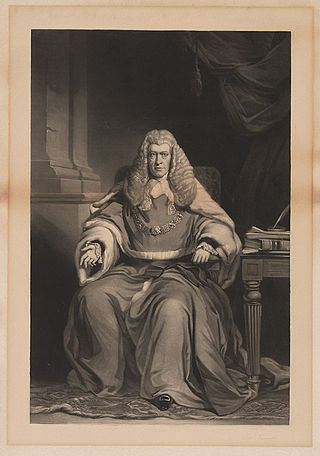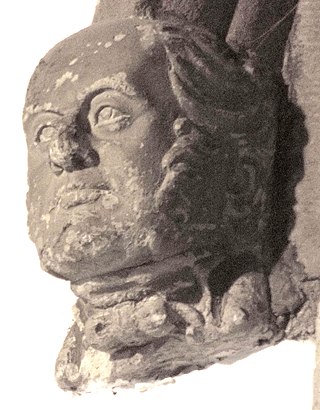
Gathorne Gathorne-Hardy, 1st Earl of Cranbrook, was a prominent British Conservative politician. He held cabinet office in every Conservative government between 1858 and 1892. He served as Home Secretary from 1867 to 1868, Secretary of State for War from 1874 to 1878, Lord President of the Council from 1885 to 1886 and as Chancellor of the Duchy of Lancaster until 1886. In 1878, he was appointed Secretary of State for India and thereafter was elevated to the peerage, entering the House of Lords as Viscount Cranbrook. He has been described as a moderate, middle-of-the-road Anglican, and a key ally of Disraeli.

Viscount Cobham is a title in the Peerage of Great Britain that was created in 1718. Owing to its special remainder, the title has passed through several families. Since 1889, it has been held by members of the Lyttelton family.

Earl of Lonsdale is a title that has been created twice in British history, firstly in the Peerage of Great Britain in 1784, and then in the Peerage of the United Kingdom in 1807, both times for members of the Lowther family.

Earl of Cranbrook is a title in the Peerage of the United Kingdom, created in 1892 for Gathorne Gathorne-Hardy, Viscount Cranbrook. The title is named after Cranbrook in the county of Kent. The Gathorne-Hardy family seat is Great Glemham House, near Saxmundham, Suffolk.
The Baronetcy of Temple, of Stowe, in the Baronetage of England, was created on the 24th of September 1611 for Thomas Temple, eldest son of John Temple of Stowe, Buckinghamshire. His great-grandson Sir Richard, 4th Baronet, was created Baron Cobham on 19 October 1714, and Viscount Cobham and Baron Cobham on 23 May 1718, the latter with a special remainder, failing his male issue to his sisters and their heirs male. Upon his death on the 13th September 1749, the barony of 1714 became extinct. Both the viscountcy and barony of 1718 passed to his elder sister, and the baronetcy passed to his second cousin once removed William Temple, of Nash House, who became 5th Baronet. On the death of Sir William's nephew Sir Richard Temple, 7th Baronet, on 15 November 1786, the baronetcy became dormant.

There have been two baronetcies created for persons with the surname Buxton, one in the Baronetage of Great Britain and one in the Baronetage of the United Kingdom. One creation is extinct while the other is extant.
There have been three baronetcies created for people with the surname Cayzer, each in the Baronetage of the United Kingdom and each for members of the same family.
The Royden Baronetcy, of Frankby Hall in the County Palatine of Chester, is a title in the Baronetage of the United Kingdom. It was created on 29 July 1905 for Thomas Royden, head of Thomas Royden & Sons, shipowners. He also served as Lord Mayor of Liverpool and represented Toxteth West in the House of Commons as a Conservative. His eldest son, the second Baronet, was Chairman of the Cunard Line and sat as Member of Parliament for Bootle. On 28 January 1944 he was created Baron Royden, of Frankby in the County Palatine of Chester, in the Peerage of the United Kingdom. However, the peerage became extinct on his death in 1950 while he was succeeded in the baronetcy by his younger brother, the third Baronet.

The Errington Baronetcy, of Ness in the County Palatine of Chester, was created in the Baronetage of the United Kingdom on 26 June 1963 for Sir Eric Errington, 1st Baronet.

There have been five baronetcies created for people with the surname Pollock, one in the Baronetage of Nova Scotia and four in the Baronetage of the United Kingdom. As of 2017 three of the creations are extant. These three creations derive from the same family to which the 1703 baronetcy was granted; the Pollock ancestor of Sir Frederick Pollock, 1st Baronet, and Sir George Pollock, 1st Baronet, married his cousin, daughter of Sir Robert Pollock, 2nd Baronet.
There have been four baronetcies created for persons with the surname Leslie, one in the Baronetage of Nova Scotia, one in the Baronetage of Ireland, one in the Baronetage of Great Britain and one in the Baronetage of the United Kingdom. Three of the creations are extant as of 2010.
John Stewart Gathorne-Hardy, 2nd Earl of Cranbrook, was a British hereditary peer, Conservative politician, and military officer.

John Hardy was a barrister, the main owner of the Low Moor ironworks, and represented Bradford in the House of Commons from 1832 to 1837 and from 1841 to 1847.

Sir John Hardy, 1st Baronet, was a British Conservative Member of Parliament.

There have been twenty one baronetcies created for persons with the surname Williams, eight in the Baronetage of England, three in the Baronetage of Great Britain and ten in the Baronetage of the United Kingdom. Only six of the creations are extant as of 2017.

There have been four baronetcies created for persons with the surname Gilmour, two in the Baronetage of Nova Scotia and two in the Baronetage of the United Kingdom. The former two are extinct and the latter two are extant.
There have been nine baronetcies created for persons with the surname Moore, two in the Baronetage of England, one in the Baronetage of Ireland, two in the Baronetage of Great Britain and four in the Baronetage of the United Kingdom. As of 2014 two creations are extant and one is considered dormant.

There have been eight baronetcies created for persons with the surname Wilson, one in the Baronetage of Ireland and six in the Baronetage of the United Kingdom.
The Worsley family is an English family that is derived from Sir Elias de Workesley, a Norman knight who was a youth at the time of the Norman conquest. He later accompanied Duke Robert II of Normandy on the First Crusade and was buried at Rhodes.

Earl of Arran is a title in the Peerage of Ireland. It is not to be confused with the title Earl of Arran in the Peerage of Scotland. The two titles refer to different places: the Aran Islands in Ireland, and the Isle of Arran in Scotland. The Irish earldom is held by the Gore family. The Scottish earldom is a separate title, held as a subsidiary title of the Duke of Hamilton.














